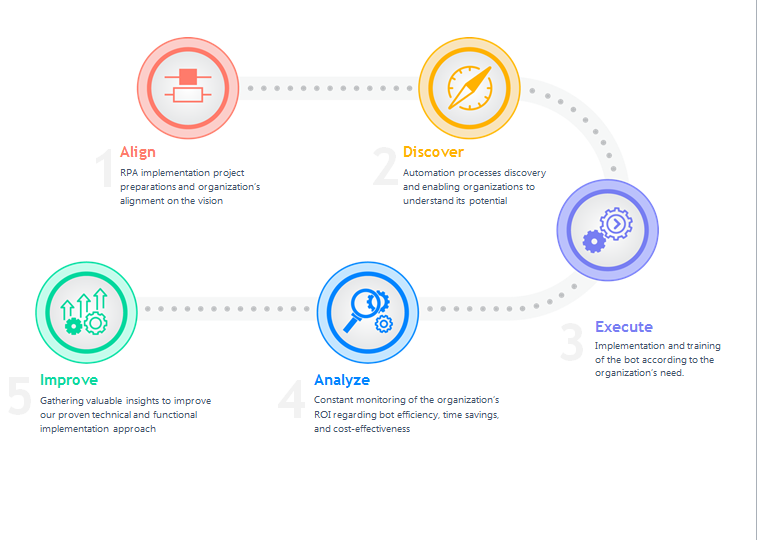Robotic process automation (RPA) is today’s technology of choice to enable streamlined business operations and reduced costs. However, when organizations start their RPA implementation journey, they face difficulties including automation anxiety, fragmented results, trouble achieving global consistency, evolving digital transformation, and defining new roles and responsibilities.
While RPA implementation might seem overwhelming at first, experts recommend a more focused approach. Deciding what business processes to automate should be based on their impact on revenue, frequent use, and how much human-level decision making is required. For instance, manual and repetitive administrative tasks like filling forms, capturing and updating data, and processing a large number of requests make an organization’s HR function an ideal candidate for automation. Similarly, an organization’s Finance and Accounting functions can automate their everyday processes to improve cost savings and boost efficiency.

Our 5-step approach
Systems Limited plays a crucial role in finding efficient ways to overcome these challenges. With experienced RPA Process Analysts, Solution Architects and Developers with proven RPA experience, these prevalent challenges can be addressed in the following five steps:
1. Align
The initial stage of any RPA project in an organization is critical. Key actions taken by us at this stage include meeting with stakeholders, setting expectations, developing a project timeline, and determining participants’ roles and responsibilities.
The key here is to make sure each stakeholder in the organization has a proficient understanding of RPA, its importance in digital transformation and the relevant business requirements. From this point, we can align on a mutual vision for the role of RPA in the organization. Through detailed preparation, we can address potential risks before and after automation, roadblocks, and concerns at the onset of the project, and avoid automation anxiety.
2. Discover
At Systems, we have RPA specialists who arrange sessions with your organizations’ SMEs and help them identify and prioritize potential uses cases for automation. The goal is to narrow down the use cases with the significant expected business impact and to clarify and document the current situation. This strategy secures buy-in from stakeholders and enables organizations to understand automation capabilities.
3. Execute
After the discovery phase, the next step is the implementation of the bot for automation of the business use case. This step involves understanding your organization’s different systems and their data exchange needs and then designing automation and bot training according to those systems and needs. Moreover, this step also covers the execution of certain non-functional aspects of bot development such as run frequency, choosing between unattended or attended automation, logging and auditing needs, and authentication and authorization.
4. Analyze
In this step, our team continuously monitors the organization’s ROI in terms of bot efficiency, cost-effectiveness, time savings, speed of innovation, etc.
5. Improve
Systems Limited’s team gathers insights from the findings from Step 4 to improve and strengthen their approach to overcome RPA implementation challenges. These insights help our RPA specialists through the Discover phase, which includes sessions with subject matter experts to enable them to identify likely use cases for automation. Our approach enforces a continuous improvement culture.
Conclusion
Challenges faced by companies during RPA implementations can be taxing to tackle when relying solely on in-house support. With a proven approach and RPA expertise, Systems Limited, in collaboration with IBM, can help identify and address implementation bottlenecks and enable rewarding investment returns for your organization.
To discover the best RPA implementation approach to overcome your business challenges, contact Systems Limited.




 EPay Punjab collected Rs.5 Billion via 1 million transactions
EPay Punjab collected Rs.5 Billion via 1 million transactions